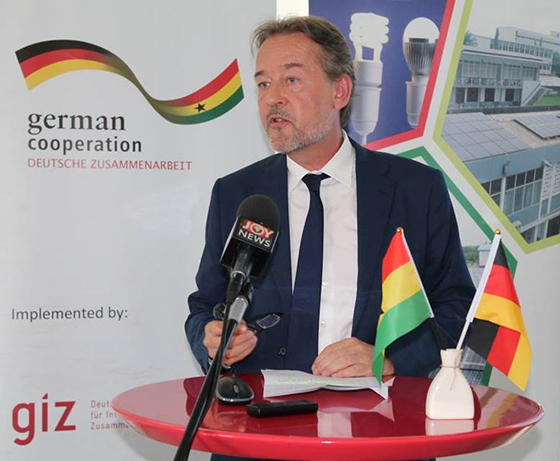
Christoph Retzlaff -German Ambassador to Ghana
The German government is supporting Ghana’s COVID-19 rapid response measures with up to 13.4 million Euros.
The amount will cover the funding of a COVID-19 Unit at the Effia Nkwanta Regional Hospital in Takoradi.
The measure builds upon previous support by the German government in the wake of the Ebola crisis.
The German Ambassador to Ghana, Mr Christoph Retzlaff, told the Daily Graphic in Accra that an eight-bed facility had already been established and furnished with medical equipment as a Severe Infectious Disease Unit.
With the support of the Western Region Coordinating Council and the Regional Health Directorate, he said, the eight-bed facility has currently been refurbished to increase the ward capacity to 25 beds, including an intensive care unit.
In addition, the ambassador said ventilators would be procured, while training on the installation and use of the equipment will be provided to personnel.
The unit, he noted, was expected to serve as a resource centre for medical training to health officials in Ghana and within the Economic Community of West African States (ECOWAS) sub-region.
Mr Retzlaff said, the measure is implemented by GIZ and funded with 300,000 Euros by the German government (German Federal Ministry for Economic Cooperation and Development (BMZ).
Mobile laboratories
The ambassador announced that the Ghana Revenue Authority (GRA), the Kumasi Centre for Collaborative Research in Tropical Medicine (KCCR) and the GIZ Governance Programme, which is funded by the German government under the support amount, have joined hands to increase Ghana’s capacity to test for COVID-19 infections even in remote areas with limited access to laboratory capacities.
GRA is temporarily repurposing its two mobile laboratory vans which are usually deployed by the Customs Division to test and classify incoming goods at Ghana’s borders.
He said the vans were procured through the GIZ Governance Programme and funded by the Embassy of the Kingdom of the Netherlands in 2017.
The ambassador announced that the KCCR will provide its experts and equipment while GIZ procures additional equipment and materials with an amount of up to 100 000 EUR.
The vans will be sent to remote (potential) hotspot areas of the outbreak to conduct COVID-19 tests on-site to minimise the time span between collecting samples and receiving results, to reduce the risk of further infections.
This is implemented by GIZ and funded with 100,000 Euros by the German government.
Diagnostic centre
Source: Graphic Online























